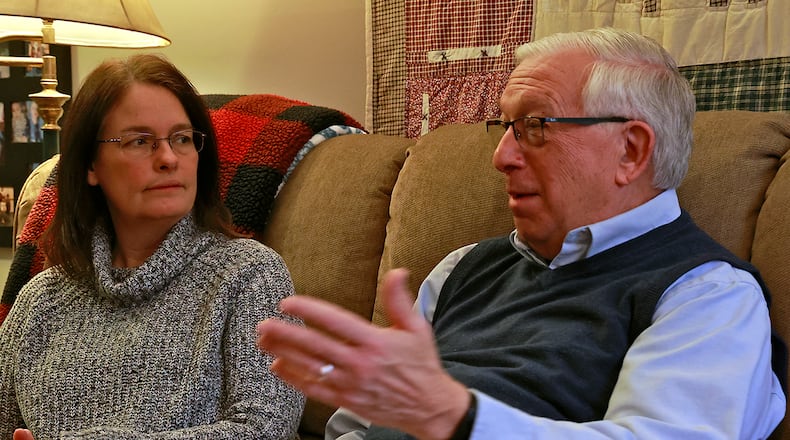The annual cost of Leqembi, also called lecanemab, is right now $26,500 and that’s why the Alzheimer’s Association is advocating for Medicare coverage.
“While this news is exciting, without insurance and Medicare coverage of this class of treatments, access will be limited to only those who can afford to pay out-of-pocket,” said Dr. Joanne Pike, Alzheimer’s Association president and CEO.
The results of the latest clinical trial of lecanemab, which is made by Eisai and Biogen, were published in the New England Journal of Medicine in December and showed a 27% reduction in cognitive decline for those in the early stages of dementia.
Local advocates
Scott Griswold, a community educator with the Alzheimer’s Association Miami Valley Chapter and a local resident in Urbana who has been diagnosed with early Alzheimer’s, said lecanemab can help individuals continue living independently and reduce burdens on caregivers.
Griswold received his diagnosis in the fall of 2018, and his wife, Karen Griswold, described first noticing changes in his behavior that left him overwhelmed and even agitated at times.
“I noticed a little bit of change in Scott’s behavior and his frustration level with normal things he was doing in his daily activities that they were becoming a little overwhelming for him,” Karen Griswold said. “There were about three specific times in about an 18-month period that Scott really felt at a low point.”
They consulted with his regular doctor, and then he was evaluated by a neurologist before he received his Alzheimer’s diagnosis.
Credit: Bill Lackey
Credit: Bill Lackey
The Griswolds went through an adjustment period following his diagnosis, which was caught early enough to allow him to make lifestyle changes to help him extend his independent living. The diagnosis impacted their careers as ordained ministers, both serving at the United Church of South Vienna. While Griswold is still a minister at the church, his wife has taken over more aspects that would be more difficult for him.
Scott then became connected with the Miami Valley Alzheimer’s Association and attending the workshops they offer to understanding aging and Alzheimer’s, effective communication, and more. Through those workshops, Scott later became a community educator for the Alzheimer’s Association. He holds discussions on the importance of early diagnosis, not to deny warning signs, and also how to incorporate healthy, wholistic living.
“I feel it’s an opportunity for new ministry for me as Karen picks up more responsibilities at the church,” Scott said.
Scott also became educated on the new therapy drug for Alzheimer’s through the Alzheimer’s Impact Movement, which is a separately incorporated advocacy affiliate of the Alzheimer’s Association. The impact movement is seeking to engage with lawmakers on public policy priorities of the Alzheimer’s and dementia community.
“This drug is to really build on independent living and active living, and that’s really what we’re striving for because as we all know how expensive it is for caregivers,” Scott said.
There are over 16 million unpaid caregivers in the U.S., he said, who are caring for individuals with Alzheimer’s. Reducing cognitive decline for individuals with Alzheimer’s can mean helping their family members and caregivers maintain their lives, as well as reduce financial burdens to family and caregivers.
“I know of individuals I’ve gone out and talked to where they had to uproot their jobs and move from one city to another to take care of aging parents. It’s difficult,” Scott said.
Scott said the organization is looking for support from lawmakers in terms of bring more access to this drug.
“The big push now with … the federal government is to get congressional support to move it into Medicare approval,” Scott said.
High price tag
Those who hope to take advantage of this infusion-based treatment may be coming up against a yearly price tag of over $26,000 if they are not able to find coverage through a clinical trial. The company distributing the drug, Eisai, said it estimated the per-patient, per-year value to be $37,600, but the company decided to price the drug below that and launch the U.S. pricing at $26,500 annually. A 200mg vial would cost $254.81, and a 500mg vial would cost $637.02.
The Centers for Medicare and Medicaid Services (CMS) made a decision earlier in the year to cover the type of drug classification lecanemab falls under when the drug is being used in CMS-approved clinical trials. The drug lacks coverage under Medicare outside of those clinical trials.
CMS released a statement after the FDA provided the accelerated approval, saying it is examining available information and may reconsider its current coverage based on this review.
“Alzheimer’s disease is a devastating illness that affects millions of Americans and their families,” said CMS Administrator Chiquita Brooks-LaSure. “At CMS, we will continue to expeditiously review the data on these products as they become available and are committed to timely access to treatments, including drugs, that improve clinically meaningful outcomes.”
In its April coverage determination, CMS said it is looking for data to answer questions about if the drug improves health outcomes for patient in broad community practice; if the benefits and harms of the treatment depend on the characteristics of patients, treating clinicians, and settings; and if the benefits and harms change over time.
About the Author


